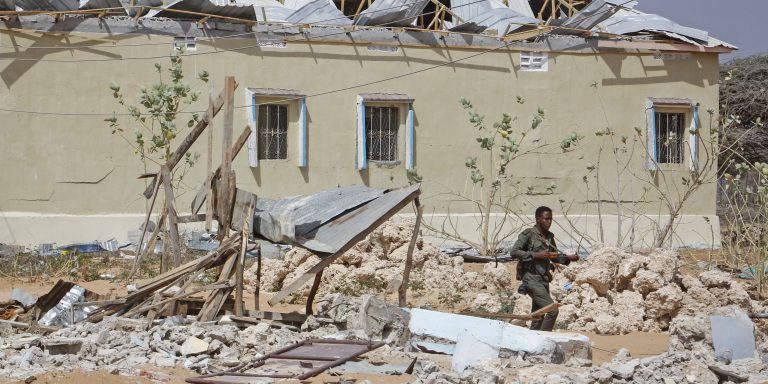INTELBRIEF
March 18, 2022
IntelBrief: Somalia Continues to Deteriorate as Al-Shabaab Gains Ground

Bottom Line Up Front
- Al-Qaeda-linked al-Shabaab, a jihadist militant group active in Somalia and throughout the broader Horn of Africa, is experiencing a resurgence.
- S. Army Gen. Steven Townsend told Congress that “we may be backsliding” and that the departure of U.S. troops from Somalia has limited Washington’s ability to contain jihadist groups including al-Shabaab.
- By drawing down forces in places like South Asia, the Sahel, and the Horn of Africa, the U.S. and allies have allowed terrorist and insurgent groups to rebuild their networks and refine their capabilities.
- While al-Shabaab was designated as a foreign terrorist organization by the U.S. in 2008, it remains unsanctioned by the United Nations, an issue that Kenyan authorities have been pushing to change for years.
Al-Shabaab, an al-Qaeda linked jihadist militant group active in Somalia and throughout the broader Horn of Africa, is experiencing a resurgence. In response, officials from the U.S. Department of Defense have requested a deployment of hundreds of troops to Somalia. U.S. troops were withdrawn from Somalia during the Trump administration and relocated to neighboring Kenya and Djibouti. U.S. intelligence agencies have assessed that, since American trainers were moved outside of Somalia, al-Shabaab has grown and gained momentum in terms of its ability to operate through larger swaths of the country. Al-Shabaab is among al-Qaeda’s most operationally capable affiliates, boasting as many as 7,000 militants. Pressure is building on the Biden administration to send troops back into Somalia and to step up U.S. security cooperation efforts before al-Shabaab metastasizes even more, further destabilizing an already volatile situation.
Under the Biden administration, drone strikes against al-Shabaab militants have declined precipitously. Since President Joseph Biden took office, only five drone strikes have been conducted against al-Shabaab. The low number of strikes, even as administration officials acknowledge a growing threat, points to some of the challenges of conducting an over-the-horizon counterterrorism campaign—an approach that has been touted as favorable also for Afghanistan. Indeed, just earlier this week, U.S. Army Gen. Steven Townsend, head of U.S. African Command (AFRICOM), which oversees responsibility for Somalia in U.S. military planning bureaucracy, told Congress that “we may be backsliding,” and that the departure of U.S. troops from Somalia (and Afghanistan) has limited Washington’s ability to contain jihadist groups linked to al-Qaeda and the Islamic State. Because U.S. troops are “commuting to work” from Djibouti, there are a host of challenges in terms of addressing the growing threat from al-Shabaab, which Gen. Townsend described as “the most lethal arm of al-Qaeda.”
There is no doubt that the Biden administration is preoccupied with efforts to handle the ongoing war in Ukraine. But this merely gets back to the many warnings of analysts during the collapse of Afghanistan in August 2021, namely, that the United States must balance great power competition with counterterrorism, not simply neglect the latter in an attempt to move on from the global war on terrorism. By drawing down forces in places like South Asia, the Sahel, and the Horn of Africa, the U.S. and allies have allowed terrorist and insurgent groups to rebuild their networks and refine their capabilities. Al-Shabaab has demonstrated reach throughout East Africa, launching attacks in Uganda, Kenya, and elsewhere. There is growing concern within the broader U.S. national security community that if the threat posed by al-Shabaab is not addressed, it could continue to grow, with al-Shabaab eventually looking to attack Western countries, including the United States.
Reporting suggests that al-Shabaab earns as much as $130 million per year from extortion and other criminal activities in Somalia. This is a robust war chest which the jihadists use to purchase new weaponry and acquire materials needed to make improvised explosive devices and other powerful bombs. While al-Shabaab was designated as a foreign terrorist organization (FTO) by the United States in 2008, it remains unsanctioned by the United Nations, an issue that Kenyan authorities and government officials have been highlighting for years as something that needs to be addressed. The unwillingness of many Security Council members, notably the United States and many European and likeminded members, to designate al-Shabaab as a terrorist group under the “1267” sanctions regime has stemmed largely from a desire to ensure that UN and international humanitarian agencies can continue to deliver lifesaving assistance. As a result, moves to propose the designation of the group and place upon its members an asset freeze and travel ban have been met with stiff resistance. However, the possibility of designating al-Shabaab, while also introducing a humanitarian carve out that would allow for a balance between robust counterterrorism and principled humanitarian assistance, may be one avenue forward.